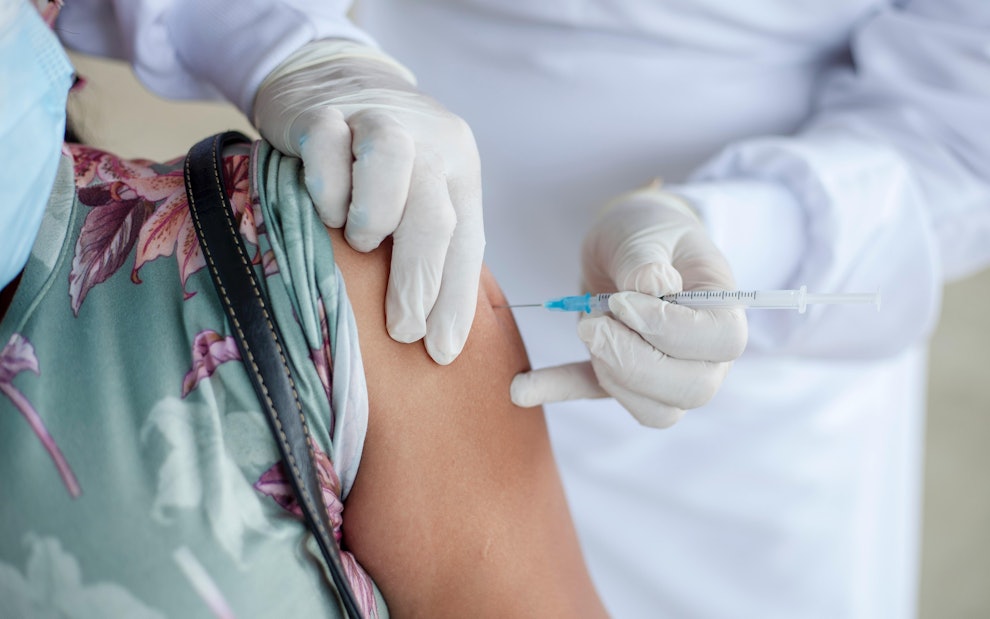The Adult Immunization Schedule: 8 Vaccines You Need As You Age
Article at a glance
Vaccinations are often prescribed for children, yet adults can also receive vaccinations to prevent infectious diseases.
Illnesses such as the Flu, HPV, and Tetanus are all illnesses that can be prevented with vaccines.
While not required (except in certain circumstances), adult vaccinations can play a vital role in the health of individuals.
Healthcare providers can help a person set up an adult immunization schedule that suits their needs.

Do Adults Need to be Vaccinated?
It’s no surprise that infants and school-age children often require vaccinations to keep themselves (and others around them) healthy. However, adult vaccinations are far less talked about, with exception of particular circumstances. So, do adults require vaccinations?
While not required, it’s highly encouraged for adults to stay up to date with their vaccinations. The Centers for Disease Control and Prevention (CDC) strongly recommend staying on top of vaccinations in order to prevent infectious diseases. Many diseases are vaccine-preventable and can be significantly reduced with the aid of adult immunizations and vaccines in older adults can help keep children and grandchildren healthy.
Note: To learn more about vaccinations and why they’re important, visit this source.

What Factors Affect the Types of Vaccines an Adult Should Receive?
Multiple factors come into play when determining which adult vaccines should be administered to individuals. These include:
Age: certain vaccines are recommended for different age groups; in some cases, different doses are determined based on age.
Prior Vaccination Status: vaccination records can determine what vaccines are needed, as well as how often the vaccination should be re-administered.
Health: certain vaccines may not be recommended for people with specific health conditions, such as those who are immunocompromised, are infected with HIV, or who are pregnant.
Occupation: certain occupations, such as being a healthcare professional, may require more vaccinations to protect immunity from direct contact with sick people.
Travel Destinations: when traveling to certain countries, you may have to receive specific vaccinations that stem beyond standard U.S. recommendations.
Sexual Activity: certain vaccines are designed to protect against sexually transmitted diseases like HPV and therefore is recommended for women and men.

What Vaccines do Adults Need?
The CDC, with guidance from the Advisory Committee on Immunization Practices (ACIP), has a list of recommended vaccines that adults ages 19–65+ should receive, including the following:
Measles, Mumps, Rubella, and Varicella (MMRV) Vaccine
The MMRV vaccine is meant to prevent Measles, Mumps, Rubella, and Varicella (also known as chickenpox) illnesses. At one point these illnesses were addressed by two different vaccines: The MMR vaccine and the Varicella vaccine, but they have now been combined into one vaccine.
The CDC recommends that 2 doses of the vaccine be administered in a person’s lifetime, and it is often given to children—however, if a person has never received the vaccine, it is encouraged to receive them as an adult (between the ages of 19 and 65). Exceptions to receiving this vaccine include:
if a person is pregnant (but is encouraged to get vaccinated after pregnancy).
if immunocompromised.
if over the age of 65.
Tetanus, Diphtheria, Pertussis (TDAP Vaccine)
The TDAP vaccine is meant to combat Tetanus, Diphtheria, and Pertussis (also known as Whooping Cough) illnesses.
It is recommended to receive one dose of the TDAP vaccine, and then one TDAP booster vaccine every 10 years after. Exceptions/special situations include:
Pregnancy: if pregnant, receive a dose of TDAP during each pregnancy.
Wound management: according to the special notes section of the CDC website, “for clean and minor wounds, administer Tdap or Td if more than 10 years since last dose of tetanus-toxoid-containing vaccine; for all other wounds, administer Tdap or Td if more than 5 years since the last dose of tetanus-toxoid-containing vaccine.”
Lack of Original Vaccination: if you are an adult that has never received the TDAP vaccine, it’s important to speak with a provider to understand the appropriate administration timeline moving forward.
Hepatitis B
The Hepatitis B vaccination protects against a Hepatitis B virus infection.
It is recommended to receive 2, 3, or 4 doses of the Hepatitis B vaccine, depending on your circumstances. For example, more doses may be required for those traveling to areas with high-risk Hep B exposure or for those who are incarcerated. Speak with a doctor to understand how many doses are appropriate for your health.
Seasonal Flu Vaccine/Influenza Vaccine
The seasonal flu or influenza vaccination (as well as other influenza antiviral medications) helps to prevent influenza virus infections.
It is recommended to receive a dose every year. There are multiple types of vaccines that can be given with the most common being the IIV4 or the RIV4 doses (which are administered by injection). Another option is the LAIV4 dose, also known as the nasal spray vaccine, but it is not recommended for those who are:
pregnant
immunocompromised
diagnosed with HIV infection
Additionally, there is a precaution advised for those who:
are diagnosed with end-stage renal disease (ESRD)
are diagnosed with heart or lung disease/alcoholism
chronic liver disease
Diabetes
Note: To learn more about the influenza vaccine for adults, visit this source.
Zoster Vaccine
The Zoster vaccine protects against herpes zoster illness (also known as shingles).
This vaccine is recommended for those 50 and older and is typically administered in 2 doses. However, the vaccine may be administered at a younger age based on certain conditions such as:
being immunocompromised
diagnosed with HIV infection
Pneumococcal Conjugate Vaccine
Pneumococcal conjugate vaccines protect against pneumococcal infections, better known as pneumonia viruses.
Pneumococcal vaccines are recommended to be received at the ages of 19+, either by receiving a PCV15 dose followed by a dose of PPSV23 or receiving one dose of PCV20.
Human Papillomavirus (HPV) Vaccine
Human Papillomavirus vaccines protect against Human Papillomavirus (HPV) infections.
An HPV vaccination is recommended to be given in 2–3 doses, depending on the age of the initial vaccination.
Exceptions to the vaccine include:
those who are pregnant (though it is recommended to get get the vaccine when no longer pregnant)
those above the age of 45
Special Circumstance Vaccines
Additionally, there are vaccines the CDC recommends if a person presents additional risk factors (such as pregnancy or immunocompromising conditions, for example), including:
Meningococcal Types A, C, W, Y: protects against epidemic Meningococcal disease.
Meningococcal Type B: protects against a separate strain of Meningococcal disease.
Haemophilus Influenzae Type B: protects against “Hib” diseases, such as meningitis. Can also protect against bronchitis and ear infections.
To learn more about these specific vaccines, visit this source.

How Often Should a Person Get Vaccinated?
This will depend on factors such as age, vaccination status, and the specific vaccine itself.
Some vaccines, such as the flu, are typically recommended to receive annually, while others such as Hepatitis A and Meningococcal vaccines may require a specific amount of doses over the course of a person’s life.
Note: The CDC lists recommended Adult Immunization Schedules based on age, health, and other indications.
What Risks are Involved with Not Getting Vaccinated?
While most vaccinations are not required (with potential exceptions to occupations and travel destinations), this doesn’t mean adults shouldn’t get vaccinated. Vaccines can help reduce the amount of preventable infectious diseases, allowing for a healthier lifestyle and less risk of sickness long term.
There are some side effects that may accompany receiving any vaccine, including:
Soreness at the injection site
Redness in the injection site
Some risks are also associated with certain vaccines. While uncommon, one can experience:
Fever
Seizures
Severe allergic reaction
Vaccines are administered by/under the supervision of trained healthcare providers who are able to quickly recognize and manage severe allergic reactions or get/provide appropriate care for seizures.
Despite potential risks, it is still recommended to get vaccinated, given that the potential side effects or risks are either far less common or far less dangerous than potentially contracting diseases that can be prevented with a vaccination.
If you receive serious repercussions from receiving a vaccination, the Vaccine Injury Compensation Program (VICP) is an alternative organization that helps those who experience serious injury from vaccines to be compensated.
Note: If you are struggling with vaccine hesitancy, it’s important to speak with your provider. Learn more about vaccine hesitancy and uncover ways to overcome it.
Are Vaccinations Covered by Health Insurance?
Multiple insurance options can provide coverage for adult vaccinations.
Private Insurance
Health Insurance Market plans and most private insurance plans are required to cover vaccines without charging a copayment or co-insurance if it’s administered by an in-network provider. The following vaccines are often covered by Health Insurance:
Hepatitis A
Hepatitis B
Herpes Zoster
Human Papillomavirus
Influenza
Measles, Mumps, Rubella
Meningococcal
Pneumococcal
Tetanus, Diphtheria, Pertussis
Varicella
Doses, age restrictions, and other vaccines may vary. Contact your insurance provider to find out what is covered.
Medicare
Medicare Part B is required to cover the following vaccines:
Influenza vaccine
Pneumococcal vaccines
Hepatitis B vaccines
Part D may cover other vaccines, but these are determined through formularies. Contacting your plan can let you know what vaccines are covered.
Medicaid
Medicaid plans often cover some adult immunizations, but others may not cover any vaccines. Contact your plan to find out what is covered.

Talking to Your Healthcare Provider About Adult Immunizations
Talking with trusted healthcare professionals, such as a primary care physician (PCP) or healthcare provider, can help ensure a person stays up to date with their vaccinations, as well as alleviate concerns about vaccinations. Some important steps regarding an adult vaccination schedule include:
Determine current vaccination status: past vaccination records from childhood can give an idea of what vaccines may be required as an adult. If a person doesn’t have vaccination records on hand, a healthcare provider can do blood tests to try and determine what vaccines have been administered.
Disclose any past or present health issues: health status can play a large factor in what types of vaccines and amount of doses a person needs, so it is vital to disclose to healthcare providers any past or present health issues/conditions to administer vaccines properly. This can also help a healthcare provider determine with you whether the vaccination benefits outweigh risks.
Stick to the vaccine schedule: once a plan has been made, stick to the vaccines and doses prescribed to prevent infections.
COVID-19 Vaccinations
While information continues to change surrounding the coronavirus and its variants, vaccinations, and treatments, it’s important to be vaccinated. Currently, Pfizer and Moderna vaccines are encouraged for everyone six months and older. Dosage and booster information may vary depending on age and health status.
To learn more about various COVID-19 vaccines and when to get them, visit this source.
To learn more about COVID-19 vaccines for older adults, visit this source.
Ways To Stay Up-to-Date With Vaccinations
It can be tough to remember which vaccinations are required when, however there are a couple ways to stay up-to-date with vaccination recommendations.
- Speak With Your Provider: If you attend your regular check-ups with your internal medicine doctor, family physicians, or other primary care provider, they will keep you updated with any recommended vaccine.
- CDC Vaccine Schedules App: The CDC now has an app that helps you to track all recommended vaccinations you may need throughout your lifetime. It contains an infant vaccination schedule, an adolescent immunization schedule, and an adult vaccine schedule right at your fingertips so you can always know which vaccines are coming up that you’re eligible for. It also gives you quick access to the Vaccine Adverse Event Reporting System (VAERS) where you can submit any adverse reactions to vaccines. It also allows you to report an outbreak response to any vaccine-preventable illness in your area. This app is recommended by doctors everywhere, including the Advisory Committee on Immunization Practices, the Centers for Disease Control and Prevention, American College of Physicians, American Academy of Family Physicians, American College of Obstetricians and Gynecologists, American College of Nurse-Midwives, American Academy of Physician Associates, American Pharmacists Association, and the Society for Healthcare Epidemiology of America.
FAQ
How do I stay informed about immunizations as I age?
Regularly attend your physical exams and speak with your primary care provider about what vaccines you are eligible for.
Sources
- https://www.cdc.gov/vaccines/schedules/hcp/imz/adult.html#vaccines-schedule
- https://www.ihs.gov/epi/immunization-and-vaccine-preventable-diseases/resources-for-patients/
- https://www.immunizekansascoalition.org/adultvaccines.asp
- https://www.cdc.gov/vaccines/hcp/acip-recs/index.html
- https://www.cdc.gov/vaccines/acip/committee/index.html
- https://www.cdc.gov/vaccines/schedules/hcp/imz/adult-conditions.html
- https://www.cdc.gov/vaccines/hcp/acip-recs/general-recs/index.html
- https://www.hrsa.gov/vaccine-compensation/covered-vaccines
- https://www.cdc.gov/vaccines/schedules/hcp/schedule-app.html
Immunization Schedule
This graphic breaks down an adult’s immunization schedule; including which vaccines to receive and when.




